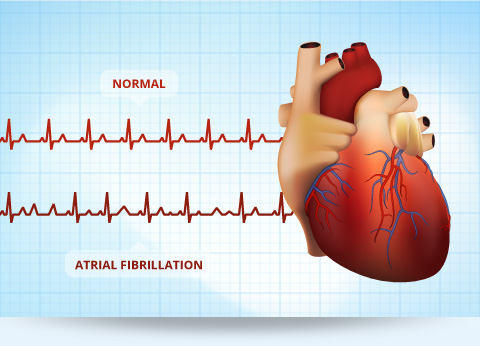Surgeon Q&A: What are the Top 5 Misconceptions about Atrial Fibrillation?
By Adam Pick on September 1, 2015
If you didn’t know, September is National Atrial Fibrillation Awareness Month. This is really important for our community as up to 35% of heart valve patients are more likely to have atrial fibrillation (AFib).

As you might imagine… Many patients are often confused when diagnosed with atrial fibrillation. For this reason, I reached out to Dr. Gan Dunnington, a heart surgeon who specializes in AFib therapy, to learn more. During our exchange, I asked Dr. Dunnington the question, “What are the Top 5 Misconceptions About Atrial Fibrillation?”

Misconception #1: Symptoms, Aging & Treatment
When diagnosed with atrial fibrillation, patients might think, “I’m not sure if I have any symptoms, I just figured I’m getting older and can’t do the things I used to be able to do.” This is one of the most common things I hear from patients with long-standing persistent atrial fibrillation. While patients with paroxysmal or intermittent AFib may have the classic racing or pounding heart beat that causes panic and an emergency room visit, those patients with more advanced atrial fibrillation often cannot feel the arrhythmia. Sometimes, the first symptoms involve a stroke, or a hospitalization for congestive heart failure.
More commonly though, patients experience decreased energy and activity capacity of someone who is missing that “atrial kick,” that can contribute up to 20% of the normal cardiac output. Many studies have been done to look at patients’ quality of life scores after ablation and restoration of normal sinus rhythm, and uniformly, quality of life improves. People feel more energy, better mental capacity, and generally are able to be more active than they could be while in afib. So, while patients may not NEED to be in normal rhythm to survive, their lives may be considerably better in normal rhythm.
The surgical treatment for AFib is called a Cox-MAZE procedure, invented by Dr. Jim Cox in the late 1980’s. It is the gold standard from which all AFib ablation is currently based. The Maze procedure can be added to any other heart surgery as an “adjunct,” or it can be done as it’s own stand-alone procedure for patients with AFib not associated with valvular or coronary disease.
Misconception #2: My AFib Is Not Fixable
I’ve met with patients who think, “I’ve had AFib so long, it cannot be fixed….They tried to fix my AFib but it can’t be fixed…..I’m too old for an ablation…” Unfortunately, patients with AFib often are not aware of all the options available to treat their disease. While medications or catheter ablation might work for some, these options are not very successful in patients with more advanced AFib. Surgical management of AFib has been the gold standard for over 20 years and now there are more minimally invasive options to make the operations involve faster recovery, and minimal down time.
In reality, AFib that has been “incurable” can often be successfully treated with surgery or a combination of surgery and catheter ablation. There is no age limit, and no limit to the time in AFib one can be cured from. It is unfortunate that many doctors are not educated on the current success rates of surgical MAZE approaches, which can exceed 80-90% successful restoration of normal rhythm. Surgeons are often seeing patients in the office who have endured years of failed treatments before ever becoming aware that there are other options than medicine or catheter ablations.
Misconception #3: AFib Surgery Is More Risky!
Many patients think, “Heart surgery involves cracking my chest….Risk of surgery is high, much higher than catheter ablation….My surgeon says it would be too risky to fix my AFib at the time of my valve surgery” Again, it is an unfortunate truth that many physicians are unaware of current surgical success rates of AFib surgery. Moreover, there are many minimally invasive options to perform arrhythmia surgery that may not involve “cracking the chest,” nor even using cardiopulmonary bypass. The risk of major complications with stand-alone AFib surgery is usually less than 1-2%, which is close to the same risk involved in catheter ablation. Yes, surgery may require somewhat longer recovery than catheter ablation, but the success rates are dramatically better if done by an expert surgeon.
As far as surgeons not wanting to treat AFib at the time of heart surgery, this is truly a problem….but it is getting better. In recent years, more surgeons have trained and started treating AFib at the time of other heart surgery, giving the patients the benefits of fewer strokes, better quality of life, fewer complications, and better overall longevity. Studies have been done to show that adding a MAZE procedure to heart surgery does not increase the risk. What’s more with all the benefits of restoring sinus rhythm, all patients that have AFib and undergo heart surgery SHOULD have their AFib addressed at surgery.
Misconception #4: Surgical Ablations Have Poor Outcomes
Patients often ask me, “Is a catheter ablation as good as a surgical ablation?” The truth is that many patients with a small burden of atrial fibrillation can be well served by a catheter ablation. Moreover, other patients cannot tolerate surgery, and it is not even an option. With that said, for those patients with persistent or long-standing persistent AFib that has been present over a year, the success rates of surgical ablation are vastly superior to catheter ablation.
In large honest series of catheter ablation, the reported success rates with multiple ablations (more than one trip to the cath lab), is less than 50-60%. Conversely, series of MAZE patients, whom have had their AFib treated surgically, often have between 75-90% success rates. What’s more, surgery involves ligating the left atrial appendage, or the “stroke center” of the heart, where clots can form that cause strokes. By eliminating this structure, we think that the risk of stroke is reduced, even if someone were to have recurrent AFib and be off blood thinner. This is an area under extensive investigation at this time.
For me personally, my happiest patients are my patients with atrial fibrillation that have been cured and are back in normal sinus rhythm. They are happy to be off of some of the anti arrhythmic medications (which often have side effects), and they are happy to be off the blood thinners in most cases, They tell me they have more energy, feel more active, and have generally an overall feeling of wellbeing that they hadn’t felt for years.
Misconception #5: My Surgeon Does Not Know How to Treat AFib
Specific to surgeon selection, patients might think, “I’m sure my cardiac surgeon must know how to treat atrial fibrillation because he is _____(older, academic, well known, famous, highly experienced, at a prestigious university).” Unfortunately, arrhythmia surgery is still a somewhat specialized field. Many very good surgeons do not understand how to do a thorough atrial fibrillation ablation at the time of surgery. Others are not versed in minimally invasive techniques. So just because a cardiac surgeon is very good at valve surgery, he or she may not be the best one to treat patients with AFib at the time of surgery. It is important for patients to ask their surgeons what their plan is regarding their AFib, and insist that it is managed appropriately with a proper MAZE procedure.
I hope this post helped you learn more about the top 5 misconceptions specific to atrial fibrillation. I know it help me. On behalf of our community, I would like to thank Dr. Dunnington for sharing his research and clinical experiences with our patients, their families and friends.
Keep on tickin!
Adam
|
Iryna says on September 3rd, 2015 at 1:58 pm |
|
My mum had Maze procedure with valvuplasty after having afib for 30 years. She came out of surgery in afib and never restored sinus rhythm. Do you think there is a chance still for her to restore sinus rhythm? Her surgery was August 2014 |
 |













